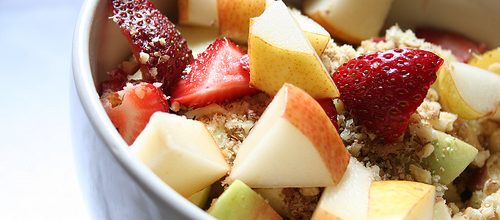
WHAT’S FOR BREAKFAST
Do you want to start your day feeling healthy and energised? Good news… it’s easy! Breakfast is the most important meal of the day so start it with plenty of fuel and you’ll feel full of energy for the rest of the day. Want to lose some weight too? A healthy start is good for you and your family and can help with weight loss. Change those bad habits starting with the first thing you eat when you wake up.
Nowadays, our fast and furious lives can leave us little time for breakfast, but all you need to do is take 10 minutes of your day to make breakfast. Start with a glass of water or fresh juice, a small thing that will make a big difference, as it cleans your digestive system, boosts your mood, improves your skin and increases your energy levels!
Next, crack an egg. Eggs are a great breakfast choice, not only because they leave you feeling fuller for longer, but also because the protein and fat in eggs helps sustain your energy levels. You’ll feel satisfied for longer, reducing the need for a mid-morning snack. As one of the most complete protein sources, they contain all the essential amino acids we need from our diets.
Despite popular belief, they won’t raise your cholesterol levels. While it’s true that eggs do contain a significant amount of cholesterol, the belief that the cholesterol you eat impacts your blood cholesterol levels has been disproven. So don’t worry about egg consumption increasing your risk of heart disease, it is only a myth!
Eggs also help with brain development and memory. Choline, an essential nutrient found in eggs, stimulates brain development and function. It’s also been linked with increased memory retention and recall, as well as improved alertness.
Eggs protect your eyesight. Two antioxidants, leutin and zeaxanthin, are present in eggs and have been linked to helping protect your eyes from the damage related to UV exposure. They have also been associated with reducing the likelihood of developing cataracts in old age.
As great as eggs are, variety is also the key to a perfectly balanced diet. Here are some other ideas:
1. Porridge made with semi-skimmed milk topped with a selection of dried fruits
Oats are a good source of insoluble fibre and may help to reduce the amount of cholesterol in the blood. They’re also slow release helping you feel fuller for longer. A tablespoon of dried fruit (30g) is also part of your five-a-day.
2. Muesli, fresh fruit and low-fat yoghurt
Fruit added to your muesli counts towards your fruit and vegetable five-a-day. Low-fat yoghurt provides calcium and protein making this a healthier way to start the day.
3. Wholegrain breakfast cereal with semi-skimmed milk
Wholegrain breakfast cereals are a good source of fibre helping you feel fuller for longer. Try and choose one that’s been fortified with vitamins and minerals.
4. Grilled mushrooms and tomatoes on a wholegrain bagel
Grilled mushrooms and tomatoes are quick and healthy additions that count towards your five-a-day. Grab a wholemeal bagel and benefit from all the nutrients of wholemeal bread.
5. Beans on toast
Beans (whether just ordinary baked beans or kidney, borlotti or black-eyed beans) also have a low GI. They’re full of soluble fibre helping you stay fuller for longer to help you better manage your weight. Serve the beans on granary toast and skip the butter for a great, low-fat breakfast.
6. Bagels with reduced fat cream cheese and smoked salmon
Bagels are high in starchy carbohydrates helping to kick-start the body into action after a fast of at least eight to 10 hours. The smoked salmon provides Omega-3 fat that’s essential for the body. Many of us eat far too much saturated fat and not enough Omega-3 fat that is vital for our health.
7. Bacon, tomatoes, beans, mushrooms and toast
For those of us who can’t resist a cooked breakfast at the weekends, try this as a healthy twist to the traditional fried breakfast. Grill the bacon, tomatoes and large, flat field mushrooms and you’ll have a quick and easy healthy cooked breakfast!
8. Crumpets and fruit spread
Crumpets are a starchy food that should ideally be the basis of every meal. The only problem with crumpets is that we tend to pile on the butter. Try a fruit spread instead skipping all the calories and fat of butter.
If you want to be a little more adventurous, here are some healthy breakfast choices from around the world:
Turkey
A typical Turkish breakfast includes cucumbers, tomatoes, olives, feta cheese, honey or jam, French bread and tea, maybe with eggs or sucuk (spicy lamb sausage) thrown in a few times a week.
The meal overall provides a well-rounded macronutrient profile by including carbohydrates, protein and fat. Eating cucumbers and tomatoes for breakfast is another chance to eat some vegetables. Olives provide a good source of heart-healthy monounsaturated fat, honey has antimicrobial properties and tea contains polyphenol compounds, particularly catechins, for antioxidants.
Israel
The most healthy breakfast foods are found in Mediterranean countries such as Israel, Cyprus and Greece. The Mediterranean diet focuses on foods rich in Omega-3 fatty acids, including whole grains, fresh fruits and vegetables, fish, olive oil and garlic.
The typical Israeli breakfast usually includes salat katzutz (chopped vegetable salad) made with tomatoes, red onion, parsley, cilantro and seedless, crunchy cucumbers and occasionally red or green peppers – all finely chopped. Unlike most salads, salat katzutz is served without dressing.
Cheese is usually included in breakfast in Israel, either tsfatit – a white cow’s milk cheese named after the Israeli city of Tsfat – or cottage cheese. Other traditional breakfast foods include yoghurt, hummus and tahini with olive oil, pitta or fresh bread and hard-boiled eggs, olives, avocado and fresh juices.
The Israeli breakfast is low in saturated fat and high in monounsaturated fat and dietary fibre.
Costa Rica
In Costa Rica, the breakfast favourite is gallo pinto – rice and black beans with eggs on the side. This breakfast will fill you up for a few hours keeping you going until lunchtime. It’s also high in protein, fibre and complex carbohydrates and is rounded off by fresh fruit or a small glass of fresh fruit juice.
As one of the world’s ‘Blue Zones’, Costa Rica has been well-studied due to its population having a longer than average life expectancy to other countries. The typical Costa Rican breakfast includes lots of pineapples, oranges, mango, papaya, corn, beans, rice, squashes, fresh cheese and eggs.
China
A typical Chinese breakfast might consist of a dumpling or bun filled with vegetables or meat, along with a cup of soya milk tea or a soupy rice porridge called congee.
A favourite street-side breakfast food is a jian bing, a very thin crêpe-like pancake cooked on a hot drum. The pancake is covered with green onions, a spicy chilli/bean paste and topped with an egg. Once the egg cooks, the pancake is rolled up, sliced in half and served hot.
Venezuela
A Venezuelan breakfast often includes baked corn flour bread called arepas, filled with cheese, fish, beef or chicken or eaten as a side with shredded beef, black beans, white cheese, avocados and/or fresh fruit juices… all great sources of protein, carbohydrates, dairy, fruit and fibre.
Black beans, also a mainstay of this country’s breakfast, contain flavonoids, fibre and folic acid. The accompanying white cheese is also a great source of calcium. To finish it off, Venezuelans drink fresh fruit juices such as papaya, mango, watermelon, orange, tangerine, cantaloupe or pineapple – all bursting with vitamins.
Vietnam
Pho, the traditional soup of Vietnam, is broth-based with rice noodles, plus the added protein of chicken, meatballs, beef or pork, as well as a plethora of vegetables and herbs such as basil, cilantro, bean sprouts, carrots, cucumber and lime.
Pho is the perfect breakfast choice since it contains all of the three energy nutrients of protein, carbohydrates and a small amount of fat combined in a delicious, low-calorie, low-fat form.
Whether you take your pick from these breakfasts of the world or opt for a simple porridge, choose carefully as it’s the most important meal of the day. Take the time to make it special, then sit back and enjoy!
To find out what is the best workout for you contact our fitness experts.





